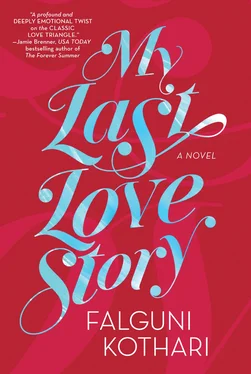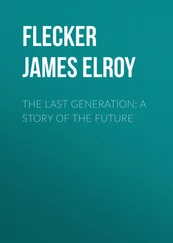“You have a good chunk of information to sort through.” Dr. Archer wound down at last. The walls in his office weren’t the calming colors of the Pacific Ocean. They were the no-nonsense white of his doctor’s coat. “Meanwhile, we’ll start monitoring your cycle. You need to come in for a detailed consult next week, Mrs. Desai. We’ll do blood work and a preliminary ultrasound. Narrow down the best route for you. Prescribe medications for maximum ovarian stimulation and so forth.” He glanced at his desktop monitor. “I have Monday afternoon and Thursday morning open. Or you can call my assistant for later dates.”
“Monday’s great,” replied Nirvaan while I pretended to scroll through my largely appointmentless phone calendar.
Monday was only three days away. I could be pregnant by the end of the month.
My husband would be dead this time next year.
My breath turned to stone in my lungs. The white walls of the doctor’s office shrank. I thought I’d finally scream.
“Call whenever you’re ready.” Dr. Archer’s words were kind. His pale blue eyes were kinder. “Call if you have questions or any doubts. Your youth really is in your favor, and it’s not infertility we’re dealing with in your situation but extenuating circumstances. Even though we have a limited amount of your husband’s sperm to work with, we have an excellent success rate, Mrs. Desai. Rest assured.”
Hysteria bubbled up in my throat. He thought I was worried that this wouldn’t work. How do I confess to him—to anyone—that I was petrified it would?
2
On the drive home, Nirvaan jabbered inside the car while the rain played a harmonica on the Jeep’s roof—fast, then slow, loud and then soft.
Since I commanded the steering wheel, I was exempt from input on the baby-making plans beyond a well-placed hum or an indistinct nod. Normally, it took about twenty minutes to get home from the clinic in Monterey, but the downpour hampered our speed today.
By home, I meant the beach house we’d rented for the year in Carmel-by-the-Sea. We’d moved in barely two weeks ago, and we were still feeling our way around the resort-town community. We weren’t complete strangers to the area. Being so close to San Jose, where we’d lived for the first two years of our marriage, both Carmel and Monterey had been our favorite spur-of-the-moment getaways. We’d often discussed buying beachfront property as an investment or retiring to a seaside town in our winter years—all this, of course, before the cancer had forced us to move to LA and in with Nirvaan’s parents. We were living our dream now, in a fashion, as part of Nirvaan’s Titanic Wish List—the list so dubbed because of the magnitude of its scope and theme.
The beach house was ideally located for our needs—twenty minutes from the fertility clinic and a scant five-minute drive from one of the best cancer hospices in the country. The Bay Area boasted a temperate climate throughout the year, getting neither super hot or insanely cold. With Carmel Beach as a backdrop, Nirvaan truly had chosen the perfect place to die.
“Why didn’t you make the appointment, Simi?”
I’d expected the question, yet I flinched when Nirvaan asked it.
“Your treatment starts next week. Let’s concentrate on one thing at a time, honey,” I replied, collecting my wits.
“You’re trying to wiggle out of our bargain.”
“No, I’m prioritizing the important stuff.” I kept my eyes peeled on the rain-slick California highway. If I looked at him, I’d melt or say something I’d regret.
“The IVF is important. You promised we’d try, Simi.” His words were matter-of-fact, but I heard the accusation hidden in their folds well enough.
“We will. We are.” My voice wobbled, and I struggled to moderate it. “Once the radia—”
“No.” He cut me off, reaching over to rub my thigh.
I hadn’t realized my body was clenched so tight.
“Both procedures together. Whatever we do, we do together, like always or not at all,” he said in a tone that would not countenance an argument.
I wanted to scream at him for being such a bully, but I couldn’t because I had promised, and I’d never broken a promise to him in my life. I might lie to him—had lied to him many times about many things. I wouldn’t deny manipulating him, but I’d never broken a promise.
When the parish church loomed up like a stone beacon on the right, I eased my foot off the accelerator and took the exit onto the local roads, driving around the church building. A backlit signpost stood, water smudged, on the front lawn. Every single day, the pastor—an austere-faced though jolly man—would put up a new adage for the world to pontificate on.
Today, it simply read, “Trust in God. He knows what He’s doing.”
My face tightened at the patently false advertisement. Khodai didn’t know what He was doing any more than Nirvaan and I did.
Trust in God? The God who’d inflicted cancer on a fun-loving young man? The God who’d orphaned children and would leave a wife as a widow? The impotent God who’d done nothing while my eighteenth birthday turned into my worst nightmare?
Thank you, but no. I could never trust God as His executive decisions had failed to impress me so far.
And Nirvaan wanted to produce another soul for Him to torture.
The rain began to pelt down in fat musical drops as I zigzagged through the streets, filling the obstinate silence inside the Jeep. I was glad for the sound. It allowed me a reprieve from all words, emblazoned or spoken or thought.
At the tip of a quiet long road with nowhere left to go, I eased the car over a pebbled driveway and parked as close to our slate-blue craftsman-style home as I could. Ahead of us, a strange black truck with monster tires blocked the front of the detached carriage house, the rear covered in blue tarpaulin.
Before I could utter a word, Nirvaan chortled, “He’s back,” in a bizarre falsetto.
“So I gathered. But what’s he brought back?”
Instead of answering the question, Nirvaan unbuckled his seat belt in one fluid motion, grabbed my face between his hands and smooched my lips, as if our recent tense moments had never happened.
It was typical of him. Nirvaan stubbornly refused to let bad moods win. I approved of the quirk with great gulps of gratitude, as one moody bitch per household was quite enough.
“Happy birthday to us, baby.” He grinned from ear to ear as our noses eskimo-kissed.
I squinted at my husband. Our birthdays weren’t for another three weeks. Mine fell on May 31, and Nirvaan’s was on June 1. I wondered what kind of present had gotten him even more excited than the visit to the fertility doctor.
Nirvaan spilled out of the Jeep before leaping up the three steps onto the thick wraparound deck where our longtime friend, the third Musketeer of our pack, Zayaan Mohammed Ali Khan, stood under the aegis of the front porch. He, too, grinned like the Cheshire cat high on cream.
I’d steeled my nerves before looking at him, but even then a gasping ache speared my heart. Zayaan was the living reminder of all that was wrong in my life, all Khodai had taken from me as part of His grand plan to keep me in line.
Astoundingly, Zayaan and Nirvaan shared their birthdays. The fact was the deciding factor in their friendship that had been founded one summer on the streets of Surat, the year they—we—turned fifteen. Same birthday, same street address, same damn-the-world temperaments, where could they—we—go wrong, really?
But we’d gone wrong. Like a roller coaster plunging off its tracks, our world had splintered apart one awful night, and I’d been left bleeding and alone, as always.
Stop wallowing in self-pity. Control yourself, and get out of the car.
Читать дальше












